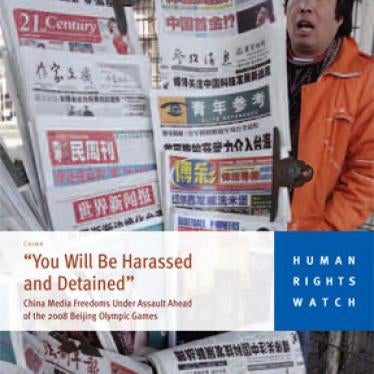(New York) - The International Olympic Committee should mark China’s official Journalists’ Day on Thursday by ending its silence on the Chinese government’s ongoing violations of its pledge on media freedoms, a commitment it made to the IOC to win its bid to host the 2008 Olympics Games in Beijing, Human Rights Watch said today.
As part of this pledge, China in theory now allows foreign journalists to speak with any consenting interviewees under temporary regulations, which were enacted on January 1, 2007 and will expire on October 17, 2008. But in practice, foreign correspondents routinely face harassment, detention and intimidation at the hands of Chinese security forces and plainclothes thugs who appear to operate at official behest.
“The IOC’s reluctance to challenge the Chinese government’s ongoing violations of media freedoms is at odds with the Olympic Charter’s dedication to ‘ethical principles’ and ‘preservation of human dignity,’” said Sophie Richardson, deputy Asia director at Human Rights Watch. “If the IOC can criticize the Chinese government’s failure to improve Beijing’s air quality ahead of the 2008 Games, why can’t it speak out about China’s failure to respect its Olympic pledge on press freedom?”
In the past month, an Agence France Presse reporter and an American colleague were harassed and detained in a public park in central Beijing for the alleged crime of taking photographs of an informal matchmaking service. Guards seized and roughed up a foreign television crew that had discovered an illegal detention center in Beijing for petitioners (rural citizens who come by the thousands to Beijing seeking redress for official injustices). The journalists were turned over to police who held them for six hours and accused them of offences including “illegally filming a government building.”
BBC correspondent Dan Griffiths spent a day in police detention after he traveled in Shengyou village in Hebei province to cover simmering unrest. Griffiths later discovered that the bolts holding his car’s wheels to the chassis had been tampered with.
Unfortunately, there have been many other similar violations of media freedom since the regulations came into effect. These have been meticulously documented and published by the media as well as by groups including Human Rights Watch, the Committee to Protect Journalists, and Reporters Without Borders. The IOC is aware of such routine violations of media freedom and of these organizations’ reports.
The temporary regulations do not extend to Chinese reporters or to the local assistants, researchers and translators on whom foreign correspondents depend. All these journalists remain vulnerable to reprisals from state security authorities for pursuing stories that run counter to official propaganda dictates on what constitutes acceptable news.
“In less than a year, some 20,000 foreign journalists are expected to arrive to Beijing to cover the Olympics, and it’s time for the IOC to step up and defend journalists’ freedom to report,” said Richardson. “What sort of a message will the IOC’s silence send to the Chinese government?”







